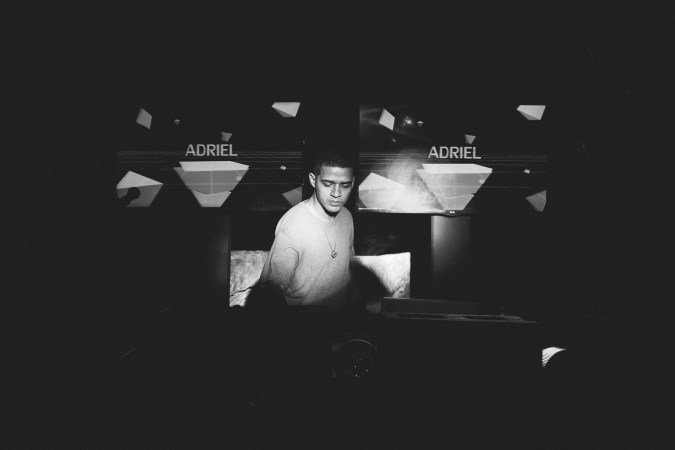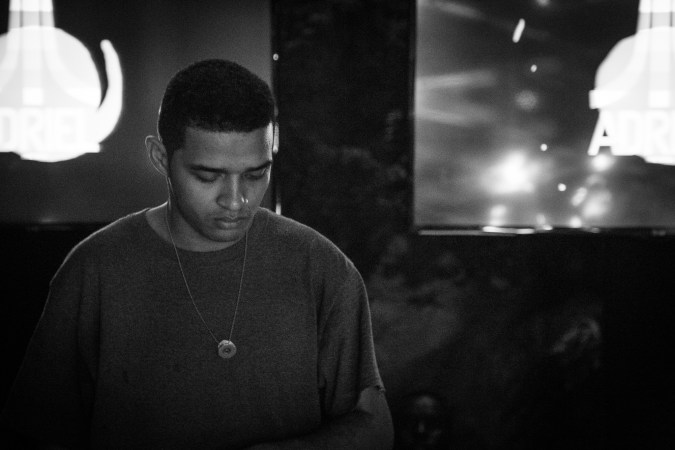Merengue and bachata may be the first genres to come to mind when we think of Dominican music, but for the past few years, the country’s electronic music scene has been booming. Stereoptico, the beloved underground label and collective based in the capital of Santo Domingo, has amassed an impressive array of beatmakers, including Cohoba, Bacayne, and D∆MNBR, who flirt with hip-hop textures in their work. The crew also includes bass maestro Maeloo and NYC-based duo Dirk Largo. Similarly, Santiago-born sister collective Mitel Dico experiments with everything from old-school house to fresh global bass, with producers like Diego Raposo, Seyer, Funsize, and Jordy Sánchez in its ranks.
Indie festival Isle of Light, which celebrated its fourth edition earlier this year, has emerged as an important platform for local electronic talent, placing artists like MULA, Volt Phonic, and Selektor 7 on the same stage as international juggernauts. Throw Mediopicky in the mix, and there’s no doubt the future is looking bright for electronic music in the Caribbean country.

23-year-old, La Romana-born Adriel is one young producer to watch; his track “Jevita,” featuring Jeremy García, is burning up our Spotify Nuevo Noise playlist. The 808DR crew co-founder has tried it all, from progressive house to French funk to retrofuturist 80s synth pop. With subtle references to Dominican pop culture and music history in his song titles and music, especially his latest full-length Merengue Dance Club, Adriel embodies the hybridity embraced by many of the country’s young producers, who are happy to reference quisqueyano culture in their work without being defined by it.
The producer was kind enough to talk to us about his origins, splitting his creativity between music and illustration, the making of “Jevita,” and more.
It seems as though, under your own name and the Co.ok alias, you’ve tried almost everything when it comes to dance music. What drew you into production?
It was the way in which I can describe my emotions through sound. I feel good depicting what I feel, what I want to talk about, and the landscapes that I come up with in my head. I got inspired by the French electronic music scene, but then I researched more scenes and, as I discovered new stuff, their music inspired mine. Then I thought about incorporating merengue in my music, since I’ve always listened to it and it’s mandatory to dance it in my family [laughs].
Each genre has shown me a different point of view and new things about how to create music. They have their own history and rules from which you can grab and apply to your own music or art. I feel I’m in the right direction to find my style.
“Jevita” represents a break from the usual dance rhythms you explore in your music. How was it working with Jeremy García and creating the track?
He contacted [808DR] through Instagram; he sent us his SoundCloud and we were amazed by his voice. After meeting and talking, I worked on the beat of the song for six or seven months, and after that it was all about giving structure to the lyrics and making the song as perfect as we possibly could.
I thought about a situation where a jevita is lonely at a party while everyone is having fun. That’s when I came up with the synths in the intro, and then more frames came to mind while I was developing the song. I showed him the track, my idea, and the possibility of doing a video for it. He had a draft for the lyrics, and we edited it together.
There are plenty of Dominican references in song titles from your Merengue Dance Club album, and even in the form of samples, like in the track of the same name. Why is it important for you to represent your country’s idiosyncrasy in your work?
It’s as important as talking about myself. It’s what I grew up with. I might talk more about myself on a personal level [in my music] in the future, or about stories between my land and others. My next song is going to have elements like Merengue Dance Club does, and it will speak more about Dominican history.
You are also an illustrator. Does this creative endeavor inform your work as a music producer?
Of course! When I begin working on a song, I have an image of the context where it would take place, and I go on and describe it and the actions that take place there using sounds. I really enjoy doing this; it’s very rewarding. In my illustrations, I feel the need to describe the beauty in something – my thoughts and feelings. It’s a feedback loop between audio, images, and what’s in my head.
What’s the mission of 808DR in the context of the Dominican Republic’s electronic scene?
It’s a collective that gathers producers and creative minds, and its mission is to help its members through tips and advice regarding production, arts, and artistic direction. We also focus on live performances, and we’re open to collaborations. We give artists complete freedom to do what they want to, however they want to, without thinking, “This is what is on trend right now, and I do it even if I don’t like it.” That way, each of us creates content we can call our own.

Stream Adriel and Jeremy García’s “Jevita” on Nuevo Noise, Remezcla and Spotify’s collaborative playlist. Read more about our favorite artists featured on Nuevo Noise here.




